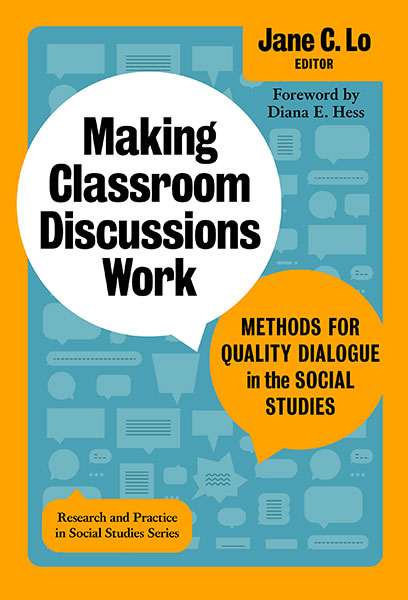Professors: Request an Exam Copy
Print copies available for US orders only. For orders outside the US, see our international distributors.
Edited by: Jane C. Lo
Foreword by: Diana E. Hess
Publication Date: January 28, 2022
Pages: 256
Series: Research and Practice in Social Studies Series

Boost learning and democratic engagement in elementary, middle, and high school social studies classrooms.
For the past 2 decades, the field of social studies education has seen an increase in research on the use of discussions as an essential instructional technique. This book examines the importance of using quality dialogue as a tool to help students understand complex issues in social studies.
This edited volume provides a collection of well-known, evidence-based discussion techniques, as well as classroom examples showing the methods in use. While using discussion as an instructional method is widely considered a best practice of civic learning, actual high-quality discussions are rare and notoriously difficult to facilitate.
Making Classroom Discussions Work is designed to guide teacher educators and classroom teachers in facilitating equitable and productive discussions that will boost learning and democratic engagement.
Book Features:
Jane C. Lo is an assistant professor of teacher education at Michigan State University.
“This methods volume makes discussion less intimidating and overwhelming, as it highlights many concrete ways to conduct quality discussion in K–12 Social Studies classrooms. All the examples are grounded in theories and research, and rooted in practice. This book will benefit pre-service and classroom teachers who are new to discussion. It can also help experienced practitioners hone and diversify their discussion techniques for equity and justice.”
—Teachers College Record
“Theoretically, empirically, and practically, Making Classroom Discussions Work: Methods for Quality Dialogue in the Social Studies is a powerful and important book. I commend Professor Lo for bringing together such a rich collection of chapters written by some of our field’s best thinkers. If you care about the importance of high-quality discussions in social studies and also want to become a better discussion teacher, I strongly encourage you to read this book.”
—From the Foreword by Diana E. Hess, dean, Karen A. Falk Distinguished Chair in Education, University of Wisconsin–Madison School of Education
“High-quality discussions are a gift—deepening understanding both of the content at hand and of high-quality discussion itself. This book details strategies for promoting discussions that are equitable and effective. By blending practical and scholarly insights, the authors in this volume respond to an urgent need. Looking at our society, we can see every day the profound costs of neglecting this priority.”
—Joseph Kahne, Dutton Presidential Chair for Education Policy and Politics, University of California, Riverside
“Lo has assembled an amazing array of scholars who review foundational work on discussion, provide in-depth classroom examples and lessons illustrating specific discussion techniques, and then broach less-traveled terrain in discussion research and practice with an emphasis on the inclusion of all students. Even educators who closely follow discussion research and pedagogy will find fresh perspectives in this book. This book is a must-read for preservice and practicing teachers, teacher educators, and researchers.”
—Patricia G. Avery, professor emeritus, University of Minnesota
Contents
Foreword Diana E. Hess vii
Acknowledgments xi
Introduction Jane C. Lo 1
Part I: Engaging in Classroom Discussions
1. Guiding Principles for Using Classroom Discussion 11
Bruce E. Larson
2. Preparing Teachers for Current and Controversial Issue Discussion 27
Kei Kawashima-Ginsberg, Mary Ellen Daneels, and Noorya Hayat
3. Supporting Civic Discussions With Younger Students 44
Terence A. Beck
Part II: Unpacking Well-Known Discussion Techniques in the Social Studies
4. Socratic Seminar: Learning With and From Each Other While Interpreting Complex Text 63
Jada Kohlmeier
5. Structured Academic Controversy: What It Can Be 73
Walter C. Parker
6. Structure Matters: Comparing Deliberation and Debate 90
Paula McAvoy and Arine Lowery
7. Document-Based Discussions in History: Orienting Students to the Discipline 106
Abby Reisman
8. Embedding Discussion Throughout Inquiry 124
María del Mar Estrada Rebull, Chauncey Monte-Sano, Amanda Jennings, and Jeff Kabat
Part III: Expanding Toward More Equitable Discussions
9. Talking Politics Online: Educating for Online Civic and Political Dialogue 143
Erica Hodgin
10. The Structures We Live In: Discussing Racialization of Neighborhoods to Transform the Null Curriculum 161
Jacob S. Bennett, H. Richard Milner IV, and Bryant O. Best
11. Get Out of Your Own Way: Sharing Power to Engage Students of Color in Authentic Conversations of Social Inequity 176
Dane Stickney, Elizabeth Milligan Cordova, and Carlos P. Hipolito-Delgado
12. Supporting Youth to Engage in Authentic Civic Dialogue in Our “Actually Existing” Democracy 192
Nicole Mirra and Antero Garcia
Concluding Thoughts 209
Jane C. Lo
Appendix A: Pledge of Allegiance Mini Unit 215
Appendix B: Ticket to Pledge Seminar 217
Appendix C: Pledge Discussion Guide 219
Appendix D: The Pledge of Allegiance Supreme Court Cases 223
Appendix E: You Be the Judge: Frazier v. Winn 225
About the Editor and Contributors 229
Index 235
Professors: Request an Exam Copy
Print copies available for US orders only. For orders outside the US, see our international distributors.